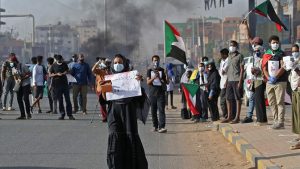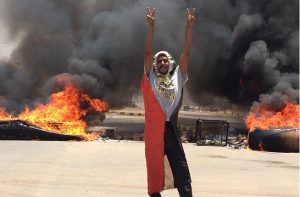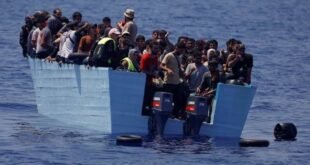03-06-2022
KHARTOUM: In the early morning of June 3, 2019, Amira Kabous called her son Mohamad Hisham after Sudanese security services had violently dispersed a sit-in protest in the capital, Khartoum. Unable to reach him, Kabous thought that Hisham was either helping his wounded friends or that he had lost his phone in the scramble.
 She learned hours later that he was one of at least 120 people killed in what has been described as a “massacre”.
She learned hours later that he was one of at least 120 people killed in what has been described as a “massacre”.
“My family spotted his body in a photograph on Facebook,” Kabous, the vice president of the Martyrs’ Families Organization, told media. “My (husband) then went to the hospital and after one hour he called to tell me that he found Mohamad.”
Three years after that harrowing day, victims’ families and survivors are still searching for justice.
In December 2019, the then civilian-military government tasked a committee with releasing a fact-finding report about the killings, and pressing charges against those believed to be responsible but the October 25 military coup that toppled the civilian administration, and derailed the country’s brief transition to democracy, destroyed the little faith that civil society groups had in the national probe.
Many are now accusing Sudan’s military leaders of obstructing justice, while renewing calls for an international investigation.
Lost evidence?
Like most people in Sudan, Kabous believes that government forces orchestrated the violent sit-in dispersal that killed her son.
 Numerous witness testimonies and open-source evidence point to a well-coordinated attack by the police, the military, and the Rapid Support Forces (RSF), a paramilitary group that evolved out of the state-backed tribal militias that killed thousands of people in the western province of Darfur.
Numerous witness testimonies and open-source evidence point to a well-coordinated attack by the police, the military, and the Rapid Support Forces (RSF), a paramilitary group that evolved out of the state-backed tribal militias that killed thousands of people in the western province of Darfur.
A month after the killing of the protesters in Khartoum, the former military spokesperson Shams al-Din Kabashi admitted that the army ordered the dispersal and that “some mistakes were made”, but the new military spokesperson, Nabil Abdullah, declined to respond when asked by media about allegations that the army was responsible. However, he did say that the military was cooperating with the national probe and awaiting the results.
“We cooperated with the committee, which conducted an extensive investigation with everyone in the army, including the leaders of the armed forces,” Abdullah said.
Nabil Adib, who heads the committee tasked with investigating the events of June 3, explained that the investigation has not been able to move forward because Abdalla Hamdok, who resigned as prime minister in January, has not been replaced.
Adib added that a number of unidentified bodies still needed to be examined by qualified foreign forensic experts, but that his mandate stipulates that only the prime minister, not any other authority, can approve logistical requests.
 “The forensic examination of unidentified bodies is very essential to our inquiry, because we need to know the number of those who were killed [in the sit-in] and those who were injured,” Adib told media. “That is part of our mandate to reach that conclusion … and it can change the nature of the offence committed.”
“The forensic examination of unidentified bodies is very essential to our inquiry, because we need to know the number of those who were killed [in the sit-in] and those who were injured,” Adib told media. “That is part of our mandate to reach that conclusion … and it can change the nature of the offence committed.”
Even before the coup, a team of medical forensic specialists from Argentina was denied access to morgues in Khartoum in July 2021, say activists and rights groups.
Yahya Abdelaziem Hussein, who founded a civil society group that aims to uncover the fate of those who went missing following the killing of the protesters on June 3, said that Sudanese forensic experts have previously accused the authorities of tampering with autopsies.
Hussein stressed that only through examining the bodies in the morgues can families of the missing find closure.
However, he warned that vital evidence could be lost by a new government committee that is tasked with quickly burying the dead to reduce overcrowding in the morgues.
“We, the committee of the missing, believe that the goal of the new [government] committee … is to bury the evidence of the sit-in dispersal and other crimes,” Hussein said. (Int’l News Desk)
 Pressmediaofindia
Pressmediaofindia




